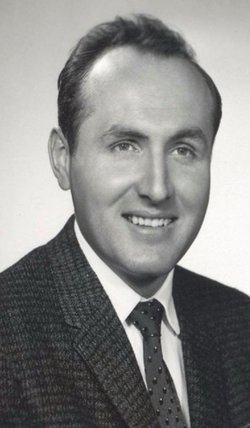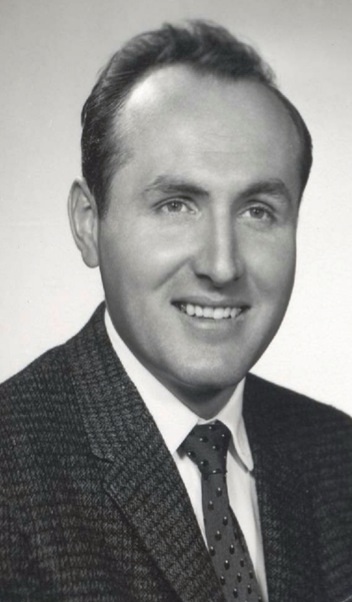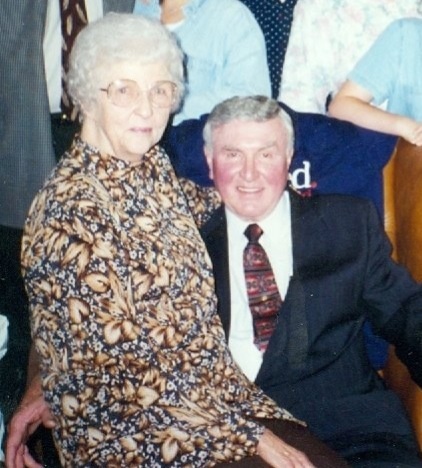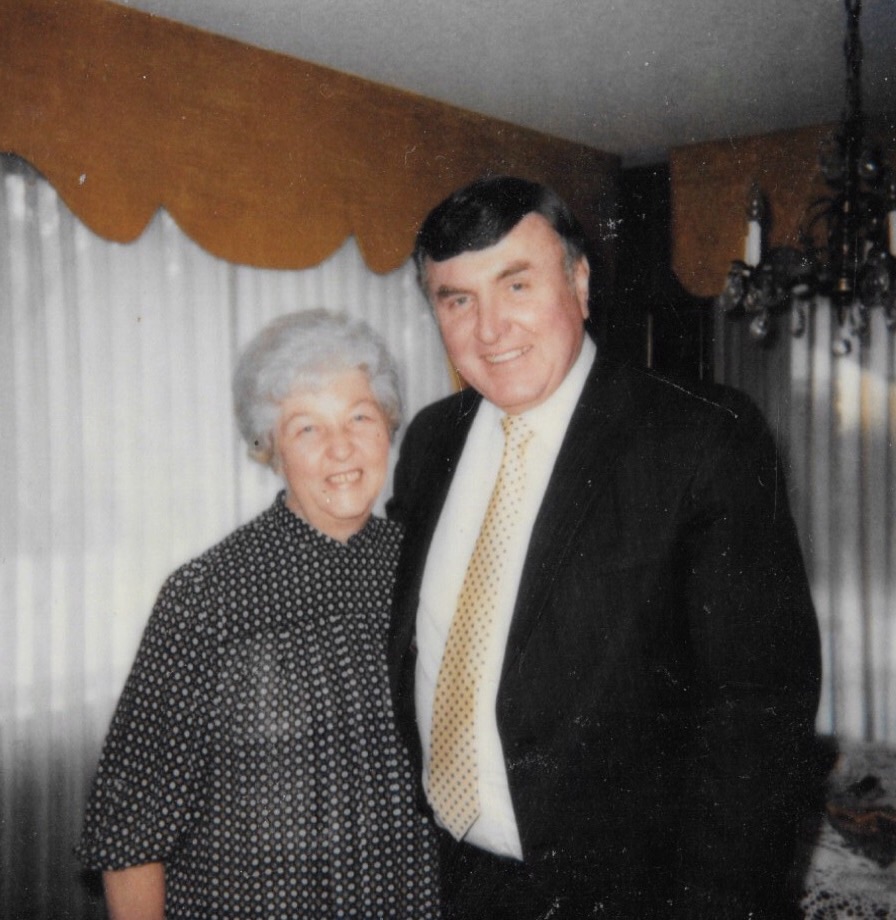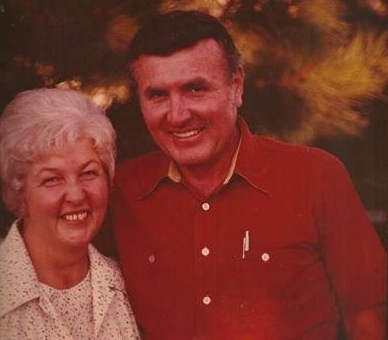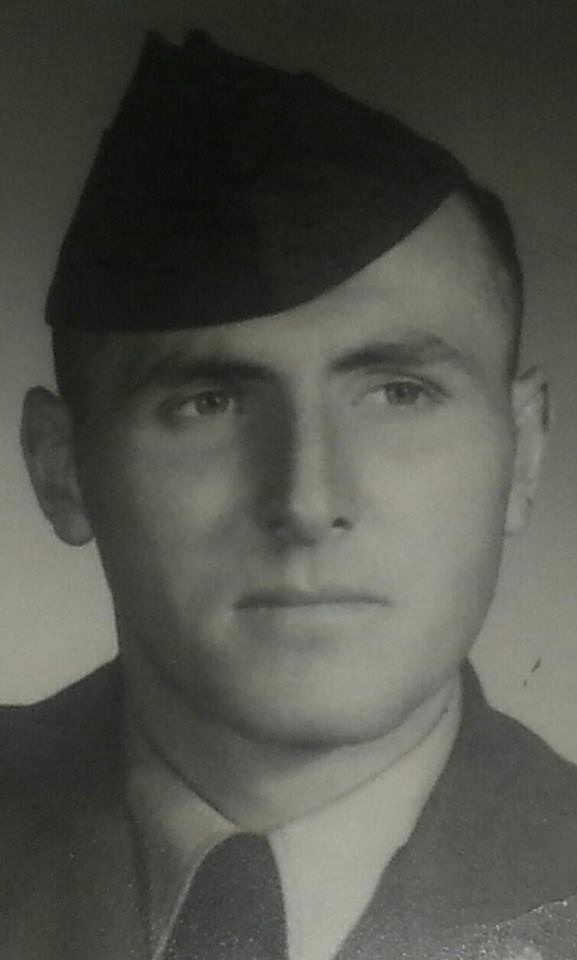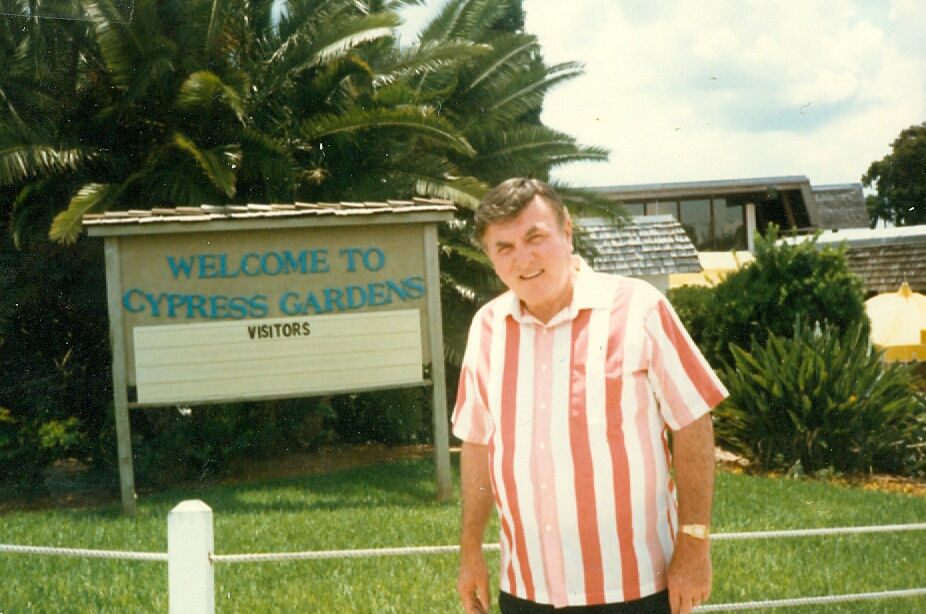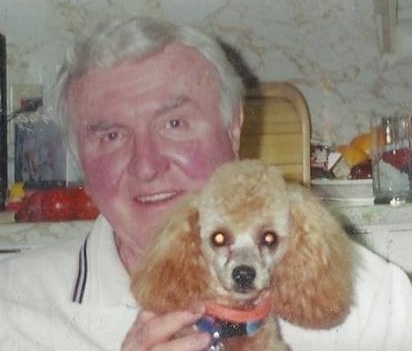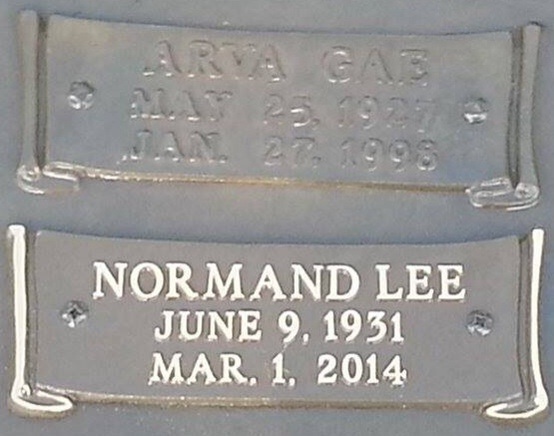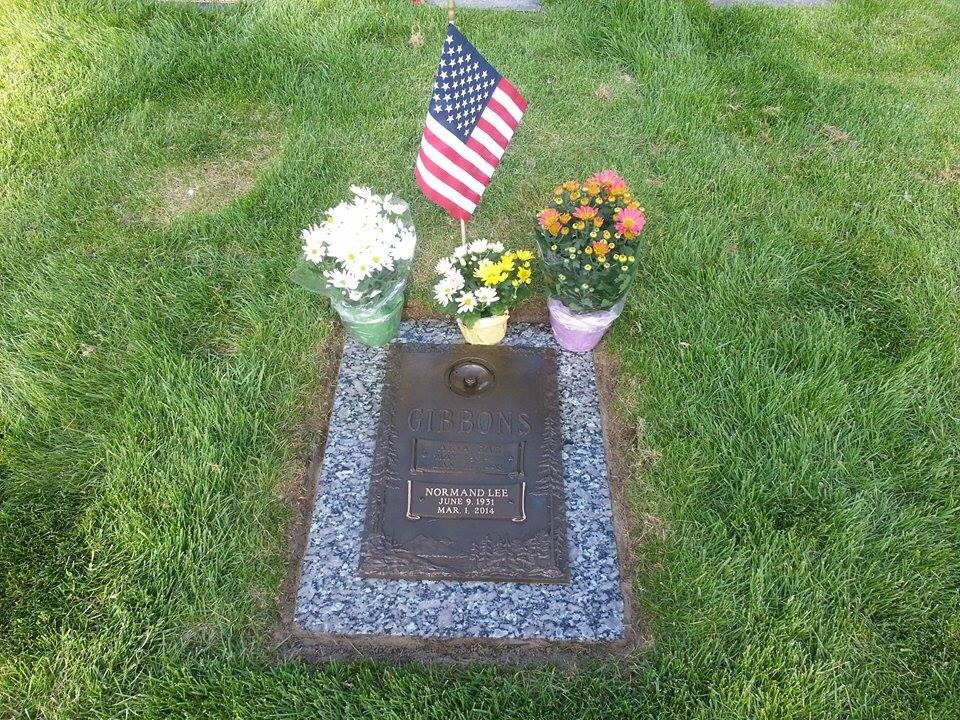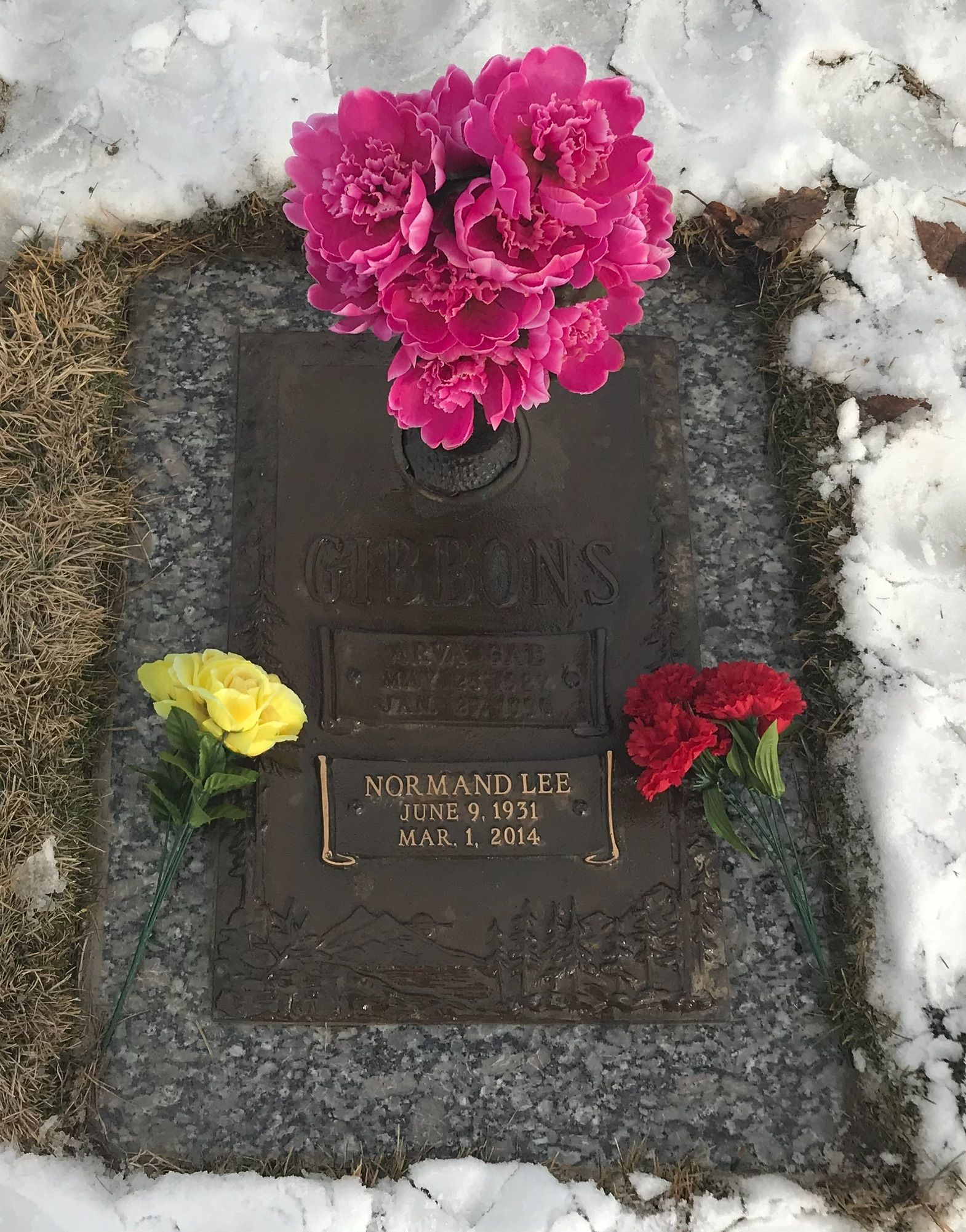Normand Lee Gibbons was born at 5:50 p.m. on Tuesday, June 9, 1931 at Los Angeles County General Hospital in Los Angeles, California to Jesse Ernest Gibbons and Eleanor Jane Asay. He spent his first years in the family homes at 1820 South Talmadge Street in Los Feliz, 2323 West Avenue 33 in Glassel Park, and 3830 Portola Avenue in El Serano.
In 1934, due to Jesse's asthma, the Gibbons family moved to the Beehive State. First residing in Castle Dale, they later moved to the then-sleepy desert town of St. George. This is where Grandpa spent the remainder of his childhood, frolicking amongst the red hills and palm trees of Utah's Dixie. Growing up in the midst of the Great Depression, life was rough but everyone made the best of it. The family lived in an old CCC house. They also purchased a shack, an old open-meat house with screen around it that had been used by the CCC. Great-Grandpa Jesse converted it into their bedroom. The home lacked electricity, heat, and running water. "We were pioneers in a way. We had a lot to learn and a lot to do. We learned to worked hard in the fields in Hurricane where we picked fruit of every variety and also worked in the sugar beet fields in St. George during those hot summer days. We used to stack hay, as high as we could get, around the wagons and then climb up and tromp the hay down," he later said in an interview for the Everett L. Cooley Oral History Project. The interviews took place on September 13 and November 20, 1990. All quotes from Grandpa were gleaned from these interviews and are being used with the permission of the Special Collections Department, J. Willard Marriott Library, University of Utah.
While living in Southern Utah, he and his family formed a friendship with the Shivwits Band of the Piute Indian Tribe. "Chief Yellow Jacket and his wife, Mabel, would come over and do their washing in our home. We had one of those old fashioned washers, you know, the ringer type that you wind by hand and it would get the job done for you. They would come and have lunch with us and leave their old folks in the back of the truck. We would have to remind them to bring them in, to not just leave them out there. I had such a fond feeling for the people of that area.
"Mabel and Jim would invite us out to the reservation during the summer months to pick their watermelons. We worked right by their own children, side-by-side. I guess I didn't see any difference at all between the Gibbons family and the Yellow Jacket family. We were brought up in such a way, and maybe it was because my father was a non-Mormon and my mother a Mormon, that we were able to bring together different factions together in our own lives. But I thought that was the way life was for people. Of course, I found out later that not everyone was as tolerant of the Indian people in the St. George area. When I got to elementary school, I saw some of those Indian boys come in crying because they were so fearful of being in the school with us. So it taught me a lot. I used to ask my mother, 'Are we really different than Mabel and James?' She would say, 'Oh no, we are not any different. It is just that we have a different color of skin. We are all human beings.'"
Growing up, his parents instilled in their children a love of learning. "My parents used to take us down to the old library--well, it was a new library in those days. It was built by the Carnegie Foundation, a very small library. But I remember they would take us there and say, 'Now look at these books, look at the pictures.' So they let us see what the world was all about, right there in that little old library. I never realized I would be a world traveler in those days, and see all the places that we used to dream about, after we saw the pictures and some of the things other people were able to do."
As a teenager, he worked part-time (three nights a week, plus a Saturday shift) washing dishes at the Big Hand Cafe for $0.50 an hour. He also helped his father out at his restaurant, Jesse and Jane's, during the lunch hour each day. He graduated from Dixie High School in 1949 and started attending Brigham Young University in the fall of that year. The following year, he took a break from school to serve a mission to the Central Atlantic States. He spent most of his time in Roanoke, Virginia and Goldsboro, North Carolina, serving as supervising elder and district leader. Grandpa enjoyed his mission and preached the Gospel to many.
While there, he witnessed the inherent racism in society. "I saw separate restrooms for the blacks and the whites. Well, it was just a different life, I couldn't believe the treatment that I saw there. That was long before the civil rights movement came into being. I would see these people go to the back of the bus, and we would sit up front. I saw all the things. I relive it. Every once in a while, when I think of the civil rights movement, I think of Boyer Jarvis, and I think of the people in this community who have done so much to help with the national civil rights movement, as well as to keep the local movement going. I think I had a love for the civil rights movement long before it ever came to be a legal matter."
Concerning the Church's policy of banning black men from holding the priesthood, he was in favor of repeal. "I couldn't figure out in my own mind why. Sure, you can have it explained to you, but it still didn't make the kind of sense that--well, it just didn't make sense. That is why I was so pleased when the priesthood was given to black people, and since then many more of them have become members of the Mormon Church. I used to see the lack of priesthood for blacks as a real negative in the Church. In those days, the Church had less than a million members"
It was in Goldsboro where he met a young missionary from Salt Lake City, Utah named Arva Gae Curtis. "I was sent there to serve with another lady missionary and met him in the chapel the first night I arrived there," she later wrote. Following the conclusion of their respective missions, Grandma and Grandpa began a lengthy courtship. When the time came to pop the question, she declined. Some time later, he asked again and received another no. Finally, on the third try, she said yes; I guess it's true what they say about the third time being the charm! On Friday, August 3, 1956, as morning broke and dawn swept over the nearby Wasatch Mountains, they were sealed for time and all eternity in the Salt Lake Temple. President John B. Hawkes, second counselor in the Salt Lake Temple presidency from 1956-1961, performed the ceremony. Grandma and Grandpa remained devoted to each other for the next forty-one years, five months, and twenty-five days until her passing on January 27, 1998. Grandpa missed her terribly and looked forward to the day they could be reunited together.
After returning home, he re-enrolled at BYU in January 1952 and continued there until June 1953, at which point he was drafted by the United States Army. "I came back and tried to get in the ROTC program. Our draft board in St. George was not very anxious in those days to see that happen. But I enrolled into the BYU ROTC, and there was a lawsuit against Norm Gibbons and a number of other returned missionaries at that time to get us drafted. We came to Salt Lake and had--I think his name was George Cannon, who took our case. He said that he would see that we got back in good standing with the BYU ROTC and not to worry about it." Cannon ended up losing the case, and off Grandpa went to Fort Ord, California for training. His unit was scheduled to be shipped to Korea, but what happened next changed everything.
Late one night, his very much inebriated commanding officer woke everyone up for an unscheduled march. A 21-year-old man from San Francisco died of a heart attack during that march. An investigation ensued and the sergeant, lieutenant, as well as several others were court martialed. His unit was then divided; some went to Korea, others remained stateside, and several were sent to Europe. Grandpa was part of the last group. He was stationed with the 521st Engineering Company in Kaiserlautern, Germany.
He became a typist for a major and a colonel, and helped inspect clothing records for their headquarters and engineering company. Grandpa also took on the volunteer directorship of a Lutheran orphanage in Kaiserslautern, spending many hours trying to secure donations and assisting a few orphans in their quest to come to America. Having received the Good Conduct Medal, he was discharged in 1955. After working for the Salt Lake City School Board during the summer of 1955, he resumed his studies at BYU. Grandpa graduated in 1957 with a Bachelor of Science degree in sociology, political science, speech, and music and in 1959 with a Master of Science degree in special education and psychology. In addition, he received a Counselor Certificate from BYU and a Secondary School Certificate as well as an Administrative and Supervision Certificate from the University of Utah.
Lowell Bennion, a longtime friend and colleague of Grandpa's, once wrote, "In the pursuit of values we discover that life is within, not outside us. The beginning and end of life is to experience it deeply in all of its finest expressions. Self-realization or self fulfillment-to be what nature and God intended us to be-appears to me to be the ultimate meaning of life. Salvation is a process of becoming, not a reward given us at the end of our journey on judgment day. Life goes on and will continue. Let it be in search of meaning." Grandpa decided early on that his mission in life was to help those in need. While at BYU, he was extended an invitation to join the Lettermen, who went on to be a very successful musical group. Grandpa turned them down, saying that he wanted to go into education and help people instead. His first job was as a placement counselor at the Utah State Industrial School in Ogden from 1957 to 1958. He helped start their parole system outside of the school. Prior to that point, it had been handled by juvenile probation workers. He was the parole officer over Salt Lake and Davis counties and half of Ogden. He worked out of the Salt Lake County Detention Home from 1958 to 1959.
Acting on a tip from his brother-in-law, Kent, Grandpa applied for a school counselor job at Cyprus High School in Magna. He was subsequently hired and remained there until 1962, working under Moroni Jensen. He became assistant principal in 1961, when Jensen was appointed to serve as president of the Utah Education Association (UEA). "This was during the George D. Clyde era in state government. The Utah teachers went on strike for the first time ever because Governor Clyde was unwilling to provide the money we felt education needed. While we were on strike, the governor did come through with some additional funds," Grandpa said. Moroni proved to be a big influence on him during this period. "[He] taught me a lot during the strike. He was a strong leader who took issue with Governor Clyde, which in my opinion was necessary."
On his first day at Cyprus, an assembly was held and Moroni introduced new staff members. When he got to Grandpa, he informed everyone that he would be in charge of the parking lot. "As a trained counselor, here is my role, not to be a counselor, but in charge of the parking lot," Grandpa thought. Moroni said, "Here are the rules for the parking lot. There have been problems in the past. I will not tolerate these parking problems any longer." Grandpa later said the parking lot turned out to be the best place for his role as a counselor. "I did more counseling. I learned to respect the young people, I learned to respect their parents. I think the students just had to know that they were important and mattered not just to themselves, but to the community and to the state, to the east side and the middle area of the district, etc."
He left Cyprus to become principal of Kearns Junior High School. In 1963, he returned to Cyprus and was appointed to serve as principal. On February 1, 1967, Grandpa joined the staff at the University of Utah. He served in a number of positions, including the first director of high school services (1967-1971), director of admissions (1970-1971), associate dean of student affairs (1971-, dean of student affairs, vice president of student affairs, and special assistant to the president on enrollment management. Grandpa retired in 1996. Grandpa developed the first computerized admission system at the U. He also directed the development of a complete computer system for financial aid, admissions, and registration. Grandpa implemented the U.'s first summer enrichment program and the first concurrent registration system, which allowed high school students to attend the U. part-time while completing their graduation requirements.
He loved working there and enjoyed all of the students and faculty members he came in contact with "We have had our ups and downs, but that is part of a great university. We don't run from problems, nor do we say that everything has to be perfect. I have seen the growth of the University Physical Plant and the beauty of this vast campus develop in such a positive way. I think the real reason we are here is to serve students. We have such marvelous opportunities available to students and the community that we must continue to convince our state leaders as to the importance the University is as a research institution and a marvelous teaching facility. We need to continue to develop quality in all areas using more state money as a base for providing for generations of students who will come here."
He was very active in the community, serving on the Valley West Hospital (now Pioneer Valley Hospital) Board of Directors for a number of years. He was a founder of the Utah Boys Ranch and was also heavily involved in the establishment and subsequent operation of the Lowell Bennion Community Service Center. He served as vice president of the Alberta Henry Education Foundation. While working at the U., he was approached by a group of local female leaders seeking his help in starting a nonprofit organization to help abused and neglected children. After some initial hesitation due to his already-hectic schedule, he ultimately decided to get involved and in 1969 co-founded the Utah Girls' Village (now Utah Youth Village). Serving alongside village founder and close friend Lila Bjorklund, he remained involved in the organization for many years until his health could no longer allow it.
In 1965, Governor Calvin L. Rampton appointed Grandpa to serve on the Utah Committee on Children and Youth. In 1970, he was a delegate to the White House Conference on Children and Youth. In 1989, Grandpa, along with his son, Ron, served in a delegation of state officials and leaders from Utah that traveled to the Soviet Union. He served as president of the Granite School District Counselors Association and Secondary School Principals Association Granite School District. He was vice president of the Secondary Council for Juvenile Protection. He was also active in the National Education Association, Utah Education Association, Granite Education Association, National Association of Secondary School Principals, Utah Counselors Association, Kearns Kiwanis Club, Magna Chamber of Commerce, and Granite District PTA. He was inducted as an honorary member of the Golden Key International Honor Society at its chartering reception at the U. in May 1984.
An active member of The Church of Jesus Christ of Latter-day Saints, Grandpa belonged to the Lake Ridge Ward while living in Magna and the Jordan North Second Ward while in West Valley City. Grandpa held numerous callings, including Deacons Quorum Advisor, Teachers Quorum Advisor, Priests Quorum Advisor, Stake MIA Activity Counselor, Sunday School Teacher, High Council, First Counselor to President Richard Winder in the North Jordan Stake Presidency, Sunday School President, Ward Clerk, Ward Employment Specialist, Temple Preparation Teacher, Temple Worker, Home Teacher, and Ward Choir member. Grandpa was ordained a High Priest on Sunday, October 10, 1965 by W. Wallace Bawden.
In 1957, he and Grandma moved to Salt Lake County, which would become their lifelong home. They first lived in a small house at 3388 South Broadway Street (7700 West) in Magna. In 1962, needing more room to raise their burgeoning family, they purchased land at 4218 South 4205 West in nearby Granger (now West Valley City). With the house mostly finished, the family moved in during the weekend of April 3, 1965. The Gibbons family remained there for the next forty-two years, creating many happy memories. Grandpa truly loved his home, his neighbors, and the west side.
Grandpa had a beautiful voice. Having trained under Joe McAllister, he started singing solo around age fourteen. "I remember the first time [McAllister] got me up to sing a solo at an LDS meeting. I actually regurgitated right after I got through. I thought that I would never sing again. I just had so many fears. Being raised the way we were, we were taught to try different things, but I had made up my mind that I tried that enough and I was not going to get involved anymore in music." In the end, though, he kept at it and music became one of the great loves of his life. He sang at countless weddings and funerals and continued to sing up to his final days.
While at BYU, he was active in campus drama circles, appearing in several musical productions. One was "Carousel," where he played the part of Mr. Snow. During his military service, he toured Europe and North Africa for three months as a member of the Special Service Division. He visited such places as Egypt, Libya, Italy, England, Holland, Sweden, Norway, Austria, Belgium, Luxembourg, and France. He took third place in a singing contest while stationed at Heidelberg, Germany.
Grandpa also enjoyed traveling, gardening, reading, going to the movies, keeping up with current events, and eating ice cream. His favorite show was "Larry King Live." A longtime subscriber to the Deseret News, he read the paper everyday without fail. One of my favorite childhood memories is of Grandpa teaching me how to read by reading the obituaries and other articles aloud; later on, we would take turns reading to each other. He really loved animals, especially dogs. He was best friends with the dog he had when growing up, Wag; Tank, who was faithfully by his side while he recovered from his stroke; and Moose, who was a constant companion in his later years.
Grandpa was a lifelong member of the Democratic Party. He and Grandma, who was a dyed-in-the-wool Republican, would often joke that they canceled out each other's votes in each election. He dedicated his life to helping and loving others without judgement. He truly epitomized the song "Have I Done Any Good in the World Today?"
On February 28, 1990, he suffered a massive stroke. Originally given a 10 percent chance at survival, he beat the odds, made a miraculous recovery, and returned to work. Grandpa endured many health struggles during his last years. A brain tumor, diagnosed in early 2006, was successfully removed. In May 2007, Grandpa suffered a minor stroke; two months later, he fell and broke his hip. This, coupled with the onset of dementia/Alzheimer's disease, necessitated the move on October 12, 2007 to The Wentworth at Draper Assisted Living Center. Despite his illness, he maintained his cheerful personality and love of life. After a weeklong decline, Grandpa passed away peacefully at 10:05 p.m. on Saturday, March 1, 2014. He was eighty-two years, eight months, and twenty days old.
My grandfather was such a wonderful person. He was so smart, and he was the world's biggest optimist. That was my favorite thing about him. He always managed to see the good in people, stayed positive in the face of adversity, and never gave up when he set out to do something. He did it! He was a survivor.
Grandpa taught me so many things: Unconditionally love and respect everyone. Don't judge others. Be a leader, not a follower. Think outside the box. Live in the moment, but still consider the future. Always keep a positive attitude. Be active in your community and help others. Appreciate music. He influenced so many of my views and beliefs on life and politics, and for that, and all these other lessons, I am indebted to him beyond measure.
Rest in peace, Grandpa. God be with you till we meet again.
He left to cherish his memory: his children, Gaston Gibbons of Havana, Florida; Mike Gibbons of Houston, Texas; Ron (Jennifer) Gibbons of Draper; Christy Curtis of Salt Lake City; and Robert Gibbons of Reno, Nevada; his grandchildren, Ryan Curtis of West Valley City, Robi Gibbons of West Jordan, Parker and Macy Gibbons of Draper, and Elizabeth Mathis of Draper; his brother, Don Gibbons, of Los Alamos, New Mexico; his brothers-in-law and sisters-in-law, Kent (Bonnie) Curtis of Taylorsville, Rula (John) Flink of Ogden, Barbara (Bill) Inkley of Magna, Bertha Curtis of Cottonwood Heights, and Dee (Ann) Bradshaw of South Jordan; his Gibbons nieces and nephews, Diana (Stan) Boschetti of Orem, Glen (Jeanne) Brandenburg of Selah, Washington; Brian (Shelia) Brandenburg of Chantilly, Virginia; Teri Brandenburg of Salt Lake City, LaDawn (Cleve) Bushnell of Kanab, Brent Gibbons of Los Alamos, Jesse Gibbons, and Dennis Gibbons; and his Curtis nieces and nephews, Darrell (Kathryn) Black of Brigham City, Mary Gae (Todd) Sibley of Stansbury Park, Kaylene (Delbert) Mulvey of East Millcreek, Oralee Black of Blanding, Wayne (Sheila) Black of Blanding, Steven Black of Blanding, Kenda (Gary) Winn of Cottonwood Heights, Janet (Jerry) McWillis of Olympus Cove, Karen (Greg) Houskeeper of Cedar City, Sheryl (Randy) Broomhead of Taylorsville, Larry Curtis of Cottonwood Heights, Sandy (Scott) Peterson of Naperville, Illinois; Stephen Curtis of Cottonwood Heights, Stuart (Caralee) Curtis of Spring, Texas; Sherman Curtis of Layton, Sara Andreason of South Jordan, Stephen (Cynthia) Flink of South Jordan, Richard (Karen) Flink of Taylorsville, Glenn (JoAnn) Flink of South Jordan, David Flink of Roy, Marianne, Donald Flink of Ogden, Alan (Alicia) Inkley of Salt Lake City, John Inkley of Tacoma, Washington; Kathy (Cory) Killpack of Hyrum, Dale (Debbie) Inkley of West Valley City, Linda Jensen of Great Bend, Kansas; Tyler Bradshaw of South Jordan, and Kelli (Sean) Burnham of Kaysville. Besides his wife, Grandpa was preceded in death by his parents; his beloved sister, Jessie Jane Brandenburg; his brothers-in-law and sisters-in-law, Dale Curtis, DeVon Curtis, Phyrl (Oris) Black, Sara (Hank) Flink, Linda Bradshaw, and LaRue Gibbons; his grandparents, Charles Gustavus Gibbons, Mary Isabel Wilson Gibbons, Jerome Asay, and Nancy Meeks Asay; his aunts and uncles, Bertha Gibbons, Fleetie Gibbons, Gus Gibbons, Marie (George) Johnson, Rosy Asay, Charles (Ada) Asay, Heber Asay, Nick Asay, Jerome "Lome" (Mary) Asay, Jr., Neal Asay, Grove Asay, Norman (Edna) Asay, Eva Asay, and Naomi "None" Jensen; and his nephew-in-law, Jim Andreason.
Funeral services were held on Thursday, March 6, 2014 at 11:00 a.m. in the Jordan North Second Ward Chapel of The Church of Jesus Christ of Latter-day Saints located at 4270 South Falcon Street (4145 West) in West Valley City. Calling hours took place on Wednesday, March 5, 2014 from 6:00-8:00 p.m. at McDougal Funeral Home located at 4330 South Redwood Road (1700 West) in Taylorsville, and prior to the services at the church on Thursday from 10:00-10:45 a.m.
Following the conclusion of the services, Grandpa was laid to rest in the family plot at Redwood Memorial Estates Cemetery located at 6500 South Redwood Road (1700 West) in Taylorsville.
Summary of funeral services:
Funeral services were held under the direction of Bishop Paul Nelson.
The family prayer was offered by J. Kent Curtis.
The prelude music, accompaniment, and postlude music was offered by Kathy Killpack.
The chorister was Diana Boschetti.
The invocation was offered by Parker Gibbons.
Musical numbers performed included: "How Great Thou Art," which was performed by the congregation; "Come, Thou Fount of Every Blessing," which was performed by Elizabeth Mathis; and "Oh! My Pa-Pa," which was performed on the flute by LaDawn Bushnell.
Speakers included: Ryan D. Curtis, Dan Clark, and Ronald N. Gibbons.
A poem entitled "Papa," which was written by Christy Gibbons-Curtis, was read by Michael Gibbons.
The benediction was offered by Teri Brandenburg.
The grave was dedicated by Bishop Brian Brandenburg of the Fair Oaks Ward, Centreville Virginia Stake.
Pallbearers included: Michael Gibbons, Ryan D. Curtis, Ronald N. Gibbons, Brian Brandenburg, Dee Bradshaw, Parker Gibbons, Pat Gallegos, and Brent Gibbons.
Honorary pallbearers included: Macy Gibbons, Glen Brandenburg, Stanley Boschetti, Donald Gibbons, Robert Gibbons, Jr., and E. Gaston Gibbons.
His obituary, which was published in the Salt Lake Tribune and Deseret News from March 4 to March 5, 2014:
"Our beloved father, grandfather, brother, uncle and friend, Normand Lee Gibbons, passed away peacefully Saturday, March 1, 2014.
"Norm was born June 9, 1931 in Los Angeles, California to Jesse Ernest and Eleanor Jane Asay Gibbons.
"His family later moved to Castle Dale and later St. George where he graduated from Dixie High School in 1949.
"He served in the US Army during the Korean Conflict. He was stationed in Kaiserslautern, Germany where he also volunteered at a Lutheran orphanage shaping his life-long commitment to serving others.
"Norm graduated from Brigham Young University in 1957 with a Bachelor of Science degree in sociology, political science, speech and music. In 1959 he received a Master of Science degree in special education and psychology.
"Norm's entire professional career was focused on helping others. He was a placement counselor at the Utah State Industrial School, a juvenile delinquent counselor, school counselor, assistant principal and principal at Cyprus High School and Kearns Jr. High School.
"In 1967 Norm joined the staff at the University of Utah working as the first director of high school services, director of admissions, dean of student affairs and vice president of student affairs. He retired in 1996.
"He was also active in his community serving on the Pioneer Valley Hospital Board of Directors for a number of years. He was a founder of the Utah Boys Ranch and was also heavily involved in the establishment and subsequent operation of both the Utah Girls Village (now Utah Youth Village) and Lowell Bennion Community Service Center.
"Norm married Arva Gae Curtis August 3, 1956 in the Salt Lake Temple. He and Gae remained devoted to each other for the next 42 years until her passing January 27, 1998. He truly loved his home, neighbors and the west side.
"He was an active member of The Church of Jesus Christ of Latter-day Saints and served a mission to the Central Atlantic States from 1950-1952. Norm held numerous callings throughout his life, including High Council and first counselor in the Stake Presidency. He had a beautiful voice and loved to sing right up to his last days.
"Norm is survived by his children: Gaston, Mike, Ron (Jennifer), Christy and Robert; grandchildren: Ryan, Robi, Elizabeth, Parker and Macy; brother, Don. Preceded in death by his wife, Gae; parents; sister, Jessie Jane Brandenburg.
"While we are heartbroken by his passing, we rejoice to know he is enjoying a joyous reunion with our dear mother and grandmother.
"Special thanks to the wonderful staff at the Wentworth/Stratford special care community in Draper. In lieu of flowers, Norm requested contributions be made to the Utah Youth Village.
"Funeral services will be held Thursday, March 6, 11:00 a.m. at the Jordan North Second Ward, 4270 South Falcon Street (4145 W.) Viewings will be held Wednesday, March 5, 6-8 p.m. at McDougal Funeral Home, 4330 South Redwood Road and Thursday at the church, 10-10:45 a.m. Interment, Redwood Memorial Estates, 6500 South Redwood Road (1700 W.)."
Normand Lee Gibbons was born at 5:50 p.m. on Tuesday, June 9, 1931 at Los Angeles County General Hospital in Los Angeles, California to Jesse Ernest Gibbons and Eleanor Jane Asay. He spent his first years in the family homes at 1820 South Talmadge Street in Los Feliz, 2323 West Avenue 33 in Glassel Park, and 3830 Portola Avenue in El Serano.
In 1934, due to Jesse's asthma, the Gibbons family moved to the Beehive State. First residing in Castle Dale, they later moved to the then-sleepy desert town of St. George. This is where Grandpa spent the remainder of his childhood, frolicking amongst the red hills and palm trees of Utah's Dixie. Growing up in the midst of the Great Depression, life was rough but everyone made the best of it. The family lived in an old CCC house. They also purchased a shack, an old open-meat house with screen around it that had been used by the CCC. Great-Grandpa Jesse converted it into their bedroom. The home lacked electricity, heat, and running water. "We were pioneers in a way. We had a lot to learn and a lot to do. We learned to worked hard in the fields in Hurricane where we picked fruit of every variety and also worked in the sugar beet fields in St. George during those hot summer days. We used to stack hay, as high as we could get, around the wagons and then climb up and tromp the hay down," he later said in an interview for the Everett L. Cooley Oral History Project. The interviews took place on September 13 and November 20, 1990. All quotes from Grandpa were gleaned from these interviews and are being used with the permission of the Special Collections Department, J. Willard Marriott Library, University of Utah.
While living in Southern Utah, he and his family formed a friendship with the Shivwits Band of the Piute Indian Tribe. "Chief Yellow Jacket and his wife, Mabel, would come over and do their washing in our home. We had one of those old fashioned washers, you know, the ringer type that you wind by hand and it would get the job done for you. They would come and have lunch with us and leave their old folks in the back of the truck. We would have to remind them to bring them in, to not just leave them out there. I had such a fond feeling for the people of that area.
"Mabel and Jim would invite us out to the reservation during the summer months to pick their watermelons. We worked right by their own children, side-by-side. I guess I didn't see any difference at all between the Gibbons family and the Yellow Jacket family. We were brought up in such a way, and maybe it was because my father was a non-Mormon and my mother a Mormon, that we were able to bring together different factions together in our own lives. But I thought that was the way life was for people. Of course, I found out later that not everyone was as tolerant of the Indian people in the St. George area. When I got to elementary school, I saw some of those Indian boys come in crying because they were so fearful of being in the school with us. So it taught me a lot. I used to ask my mother, 'Are we really different than Mabel and James?' She would say, 'Oh no, we are not any different. It is just that we have a different color of skin. We are all human beings.'"
Growing up, his parents instilled in their children a love of learning. "My parents used to take us down to the old library--well, it was a new library in those days. It was built by the Carnegie Foundation, a very small library. But I remember they would take us there and say, 'Now look at these books, look at the pictures.' So they let us see what the world was all about, right there in that little old library. I never realized I would be a world traveler in those days, and see all the places that we used to dream about, after we saw the pictures and some of the things other people were able to do."
As a teenager, he worked part-time (three nights a week, plus a Saturday shift) washing dishes at the Big Hand Cafe for $0.50 an hour. He also helped his father out at his restaurant, Jesse and Jane's, during the lunch hour each day. He graduated from Dixie High School in 1949 and started attending Brigham Young University in the fall of that year. The following year, he took a break from school to serve a mission to the Central Atlantic States. He spent most of his time in Roanoke, Virginia and Goldsboro, North Carolina, serving as supervising elder and district leader. Grandpa enjoyed his mission and preached the Gospel to many.
While there, he witnessed the inherent racism in society. "I saw separate restrooms for the blacks and the whites. Well, it was just a different life, I couldn't believe the treatment that I saw there. That was long before the civil rights movement came into being. I would see these people go to the back of the bus, and we would sit up front. I saw all the things. I relive it. Every once in a while, when I think of the civil rights movement, I think of Boyer Jarvis, and I think of the people in this community who have done so much to help with the national civil rights movement, as well as to keep the local movement going. I think I had a love for the civil rights movement long before it ever came to be a legal matter."
Concerning the Church's policy of banning black men from holding the priesthood, he was in favor of repeal. "I couldn't figure out in my own mind why. Sure, you can have it explained to you, but it still didn't make the kind of sense that--well, it just didn't make sense. That is why I was so pleased when the priesthood was given to black people, and since then many more of them have become members of the Mormon Church. I used to see the lack of priesthood for blacks as a real negative in the Church. In those days, the Church had less than a million members"
It was in Goldsboro where he met a young missionary from Salt Lake City, Utah named Arva Gae Curtis. "I was sent there to serve with another lady missionary and met him in the chapel the first night I arrived there," she later wrote. Following the conclusion of their respective missions, Grandma and Grandpa began a lengthy courtship. When the time came to pop the question, she declined. Some time later, he asked again and received another no. Finally, on the third try, she said yes; I guess it's true what they say about the third time being the charm! On Friday, August 3, 1956, as morning broke and dawn swept over the nearby Wasatch Mountains, they were sealed for time and all eternity in the Salt Lake Temple. President John B. Hawkes, second counselor in the Salt Lake Temple presidency from 1956-1961, performed the ceremony. Grandma and Grandpa remained devoted to each other for the next forty-one years, five months, and twenty-five days until her passing on January 27, 1998. Grandpa missed her terribly and looked forward to the day they could be reunited together.
After returning home, he re-enrolled at BYU in January 1952 and continued there until June 1953, at which point he was drafted by the United States Army. "I came back and tried to get in the ROTC program. Our draft board in St. George was not very anxious in those days to see that happen. But I enrolled into the BYU ROTC, and there was a lawsuit against Norm Gibbons and a number of other returned missionaries at that time to get us drafted. We came to Salt Lake and had--I think his name was George Cannon, who took our case. He said that he would see that we got back in good standing with the BYU ROTC and not to worry about it." Cannon ended up losing the case, and off Grandpa went to Fort Ord, California for training. His unit was scheduled to be shipped to Korea, but what happened next changed everything.
Late one night, his very much inebriated commanding officer woke everyone up for an unscheduled march. A 21-year-old man from San Francisco died of a heart attack during that march. An investigation ensued and the sergeant, lieutenant, as well as several others were court martialed. His unit was then divided; some went to Korea, others remained stateside, and several were sent to Europe. Grandpa was part of the last group. He was stationed with the 521st Engineering Company in Kaiserlautern, Germany.
He became a typist for a major and a colonel, and helped inspect clothing records for their headquarters and engineering company. Grandpa also took on the volunteer directorship of a Lutheran orphanage in Kaiserslautern, spending many hours trying to secure donations and assisting a few orphans in their quest to come to America. Having received the Good Conduct Medal, he was discharged in 1955. After working for the Salt Lake City School Board during the summer of 1955, he resumed his studies at BYU. Grandpa graduated in 1957 with a Bachelor of Science degree in sociology, political science, speech, and music and in 1959 with a Master of Science degree in special education and psychology. In addition, he received a Counselor Certificate from BYU and a Secondary School Certificate as well as an Administrative and Supervision Certificate from the University of Utah.
Lowell Bennion, a longtime friend and colleague of Grandpa's, once wrote, "In the pursuit of values we discover that life is within, not outside us. The beginning and end of life is to experience it deeply in all of its finest expressions. Self-realization or self fulfillment-to be what nature and God intended us to be-appears to me to be the ultimate meaning of life. Salvation is a process of becoming, not a reward given us at the end of our journey on judgment day. Life goes on and will continue. Let it be in search of meaning." Grandpa decided early on that his mission in life was to help those in need. While at BYU, he was extended an invitation to join the Lettermen, who went on to be a very successful musical group. Grandpa turned them down, saying that he wanted to go into education and help people instead. His first job was as a placement counselor at the Utah State Industrial School in Ogden from 1957 to 1958. He helped start their parole system outside of the school. Prior to that point, it had been handled by juvenile probation workers. He was the parole officer over Salt Lake and Davis counties and half of Ogden. He worked out of the Salt Lake County Detention Home from 1958 to 1959.
Acting on a tip from his brother-in-law, Kent, Grandpa applied for a school counselor job at Cyprus High School in Magna. He was subsequently hired and remained there until 1962, working under Moroni Jensen. He became assistant principal in 1961, when Jensen was appointed to serve as president of the Utah Education Association (UEA). "This was during the George D. Clyde era in state government. The Utah teachers went on strike for the first time ever because Governor Clyde was unwilling to provide the money we felt education needed. While we were on strike, the governor did come through with some additional funds," Grandpa said. Moroni proved to be a big influence on him during this period. "[He] taught me a lot during the strike. He was a strong leader who took issue with Governor Clyde, which in my opinion was necessary."
On his first day at Cyprus, an assembly was held and Moroni introduced new staff members. When he got to Grandpa, he informed everyone that he would be in charge of the parking lot. "As a trained counselor, here is my role, not to be a counselor, but in charge of the parking lot," Grandpa thought. Moroni said, "Here are the rules for the parking lot. There have been problems in the past. I will not tolerate these parking problems any longer." Grandpa later said the parking lot turned out to be the best place for his role as a counselor. "I did more counseling. I learned to respect the young people, I learned to respect their parents. I think the students just had to know that they were important and mattered not just to themselves, but to the community and to the state, to the east side and the middle area of the district, etc."
He left Cyprus to become principal of Kearns Junior High School. In 1963, he returned to Cyprus and was appointed to serve as principal. On February 1, 1967, Grandpa joined the staff at the University of Utah. He served in a number of positions, including the first director of high school services (1967-1971), director of admissions (1970-1971), associate dean of student affairs (1971-, dean of student affairs, vice president of student affairs, and special assistant to the president on enrollment management. Grandpa retired in 1996. Grandpa developed the first computerized admission system at the U. He also directed the development of a complete computer system for financial aid, admissions, and registration. Grandpa implemented the U.'s first summer enrichment program and the first concurrent registration system, which allowed high school students to attend the U. part-time while completing their graduation requirements.
He loved working there and enjoyed all of the students and faculty members he came in contact with "We have had our ups and downs, but that is part of a great university. We don't run from problems, nor do we say that everything has to be perfect. I have seen the growth of the University Physical Plant and the beauty of this vast campus develop in such a positive way. I think the real reason we are here is to serve students. We have such marvelous opportunities available to students and the community that we must continue to convince our state leaders as to the importance the University is as a research institution and a marvelous teaching facility. We need to continue to develop quality in all areas using more state money as a base for providing for generations of students who will come here."
He was very active in the community, serving on the Valley West Hospital (now Pioneer Valley Hospital) Board of Directors for a number of years. He was a founder of the Utah Boys Ranch and was also heavily involved in the establishment and subsequent operation of the Lowell Bennion Community Service Center. He served as vice president of the Alberta Henry Education Foundation. While working at the U., he was approached by a group of local female leaders seeking his help in starting a nonprofit organization to help abused and neglected children. After some initial hesitation due to his already-hectic schedule, he ultimately decided to get involved and in 1969 co-founded the Utah Girls' Village (now Utah Youth Village). Serving alongside village founder and close friend Lila Bjorklund, he remained involved in the organization for many years until his health could no longer allow it.
In 1965, Governor Calvin L. Rampton appointed Grandpa to serve on the Utah Committee on Children and Youth. In 1970, he was a delegate to the White House Conference on Children and Youth. In 1989, Grandpa, along with his son, Ron, served in a delegation of state officials and leaders from Utah that traveled to the Soviet Union. He served as president of the Granite School District Counselors Association and Secondary School Principals Association Granite School District. He was vice president of the Secondary Council for Juvenile Protection. He was also active in the National Education Association, Utah Education Association, Granite Education Association, National Association of Secondary School Principals, Utah Counselors Association, Kearns Kiwanis Club, Magna Chamber of Commerce, and Granite District PTA. He was inducted as an honorary member of the Golden Key International Honor Society at its chartering reception at the U. in May 1984.
An active member of The Church of Jesus Christ of Latter-day Saints, Grandpa belonged to the Lake Ridge Ward while living in Magna and the Jordan North Second Ward while in West Valley City. Grandpa held numerous callings, including Deacons Quorum Advisor, Teachers Quorum Advisor, Priests Quorum Advisor, Stake MIA Activity Counselor, Sunday School Teacher, High Council, First Counselor to President Richard Winder in the North Jordan Stake Presidency, Sunday School President, Ward Clerk, Ward Employment Specialist, Temple Preparation Teacher, Temple Worker, Home Teacher, and Ward Choir member. Grandpa was ordained a High Priest on Sunday, October 10, 1965 by W. Wallace Bawden.
In 1957, he and Grandma moved to Salt Lake County, which would become their lifelong home. They first lived in a small house at 3388 South Broadway Street (7700 West) in Magna. In 1962, needing more room to raise their burgeoning family, they purchased land at 4218 South 4205 West in nearby Granger (now West Valley City). With the house mostly finished, the family moved in during the weekend of April 3, 1965. The Gibbons family remained there for the next forty-two years, creating many happy memories. Grandpa truly loved his home, his neighbors, and the west side.
Grandpa had a beautiful voice. Having trained under Joe McAllister, he started singing solo around age fourteen. "I remember the first time [McAllister] got me up to sing a solo at an LDS meeting. I actually regurgitated right after I got through. I thought that I would never sing again. I just had so many fears. Being raised the way we were, we were taught to try different things, but I had made up my mind that I tried that enough and I was not going to get involved anymore in music." In the end, though, he kept at it and music became one of the great loves of his life. He sang at countless weddings and funerals and continued to sing up to his final days.
While at BYU, he was active in campus drama circles, appearing in several musical productions. One was "Carousel," where he played the part of Mr. Snow. During his military service, he toured Europe and North Africa for three months as a member of the Special Service Division. He visited such places as Egypt, Libya, Italy, England, Holland, Sweden, Norway, Austria, Belgium, Luxembourg, and France. He took third place in a singing contest while stationed at Heidelberg, Germany.
Grandpa also enjoyed traveling, gardening, reading, going to the movies, keeping up with current events, and eating ice cream. His favorite show was "Larry King Live." A longtime subscriber to the Deseret News, he read the paper everyday without fail. One of my favorite childhood memories is of Grandpa teaching me how to read by reading the obituaries and other articles aloud; later on, we would take turns reading to each other. He really loved animals, especially dogs. He was best friends with the dog he had when growing up, Wag; Tank, who was faithfully by his side while he recovered from his stroke; and Moose, who was a constant companion in his later years.
Grandpa was a lifelong member of the Democratic Party. He and Grandma, who was a dyed-in-the-wool Republican, would often joke that they canceled out each other's votes in each election. He dedicated his life to helping and loving others without judgement. He truly epitomized the song "Have I Done Any Good in the World Today?"
On February 28, 1990, he suffered a massive stroke. Originally given a 10 percent chance at survival, he beat the odds, made a miraculous recovery, and returned to work. Grandpa endured many health struggles during his last years. A brain tumor, diagnosed in early 2006, was successfully removed. In May 2007, Grandpa suffered a minor stroke; two months later, he fell and broke his hip. This, coupled with the onset of dementia/Alzheimer's disease, necessitated the move on October 12, 2007 to The Wentworth at Draper Assisted Living Center. Despite his illness, he maintained his cheerful personality and love of life. After a weeklong decline, Grandpa passed away peacefully at 10:05 p.m. on Saturday, March 1, 2014. He was eighty-two years, eight months, and twenty days old.
My grandfather was such a wonderful person. He was so smart, and he was the world's biggest optimist. That was my favorite thing about him. He always managed to see the good in people, stayed positive in the face of adversity, and never gave up when he set out to do something. He did it! He was a survivor.
Grandpa taught me so many things: Unconditionally love and respect everyone. Don't judge others. Be a leader, not a follower. Think outside the box. Live in the moment, but still consider the future. Always keep a positive attitude. Be active in your community and help others. Appreciate music. He influenced so many of my views and beliefs on life and politics, and for that, and all these other lessons, I am indebted to him beyond measure.
Rest in peace, Grandpa. God be with you till we meet again.
He left to cherish his memory: his children, Gaston Gibbons of Havana, Florida; Mike Gibbons of Houston, Texas; Ron (Jennifer) Gibbons of Draper; Christy Curtis of Salt Lake City; and Robert Gibbons of Reno, Nevada; his grandchildren, Ryan Curtis of West Valley City, Robi Gibbons of West Jordan, Parker and Macy Gibbons of Draper, and Elizabeth Mathis of Draper; his brother, Don Gibbons, of Los Alamos, New Mexico; his brothers-in-law and sisters-in-law, Kent (Bonnie) Curtis of Taylorsville, Rula (John) Flink of Ogden, Barbara (Bill) Inkley of Magna, Bertha Curtis of Cottonwood Heights, and Dee (Ann) Bradshaw of South Jordan; his Gibbons nieces and nephews, Diana (Stan) Boschetti of Orem, Glen (Jeanne) Brandenburg of Selah, Washington; Brian (Shelia) Brandenburg of Chantilly, Virginia; Teri Brandenburg of Salt Lake City, LaDawn (Cleve) Bushnell of Kanab, Brent Gibbons of Los Alamos, Jesse Gibbons, and Dennis Gibbons; and his Curtis nieces and nephews, Darrell (Kathryn) Black of Brigham City, Mary Gae (Todd) Sibley of Stansbury Park, Kaylene (Delbert) Mulvey of East Millcreek, Oralee Black of Blanding, Wayne (Sheila) Black of Blanding, Steven Black of Blanding, Kenda (Gary) Winn of Cottonwood Heights, Janet (Jerry) McWillis of Olympus Cove, Karen (Greg) Houskeeper of Cedar City, Sheryl (Randy) Broomhead of Taylorsville, Larry Curtis of Cottonwood Heights, Sandy (Scott) Peterson of Naperville, Illinois; Stephen Curtis of Cottonwood Heights, Stuart (Caralee) Curtis of Spring, Texas; Sherman Curtis of Layton, Sara Andreason of South Jordan, Stephen (Cynthia) Flink of South Jordan, Richard (Karen) Flink of Taylorsville, Glenn (JoAnn) Flink of South Jordan, David Flink of Roy, Marianne, Donald Flink of Ogden, Alan (Alicia) Inkley of Salt Lake City, John Inkley of Tacoma, Washington; Kathy (Cory) Killpack of Hyrum, Dale (Debbie) Inkley of West Valley City, Linda Jensen of Great Bend, Kansas; Tyler Bradshaw of South Jordan, and Kelli (Sean) Burnham of Kaysville. Besides his wife, Grandpa was preceded in death by his parents; his beloved sister, Jessie Jane Brandenburg; his brothers-in-law and sisters-in-law, Dale Curtis, DeVon Curtis, Phyrl (Oris) Black, Sara (Hank) Flink, Linda Bradshaw, and LaRue Gibbons; his grandparents, Charles Gustavus Gibbons, Mary Isabel Wilson Gibbons, Jerome Asay, and Nancy Meeks Asay; his aunts and uncles, Bertha Gibbons, Fleetie Gibbons, Gus Gibbons, Marie (George) Johnson, Rosy Asay, Charles (Ada) Asay, Heber Asay, Nick Asay, Jerome "Lome" (Mary) Asay, Jr., Neal Asay, Grove Asay, Norman (Edna) Asay, Eva Asay, and Naomi "None" Jensen; and his nephew-in-law, Jim Andreason.
Funeral services were held on Thursday, March 6, 2014 at 11:00 a.m. in the Jordan North Second Ward Chapel of The Church of Jesus Christ of Latter-day Saints located at 4270 South Falcon Street (4145 West) in West Valley City. Calling hours took place on Wednesday, March 5, 2014 from 6:00-8:00 p.m. at McDougal Funeral Home located at 4330 South Redwood Road (1700 West) in Taylorsville, and prior to the services at the church on Thursday from 10:00-10:45 a.m.
Following the conclusion of the services, Grandpa was laid to rest in the family plot at Redwood Memorial Estates Cemetery located at 6500 South Redwood Road (1700 West) in Taylorsville.
Summary of funeral services:
Funeral services were held under the direction of Bishop Paul Nelson.
The family prayer was offered by J. Kent Curtis.
The prelude music, accompaniment, and postlude music was offered by Kathy Killpack.
The chorister was Diana Boschetti.
The invocation was offered by Parker Gibbons.
Musical numbers performed included: "How Great Thou Art," which was performed by the congregation; "Come, Thou Fount of Every Blessing," which was performed by Elizabeth Mathis; and "Oh! My Pa-Pa," which was performed on the flute by LaDawn Bushnell.
Speakers included: Ryan D. Curtis, Dan Clark, and Ronald N. Gibbons.
A poem entitled "Papa," which was written by Christy Gibbons-Curtis, was read by Michael Gibbons.
The benediction was offered by Teri Brandenburg.
The grave was dedicated by Bishop Brian Brandenburg of the Fair Oaks Ward, Centreville Virginia Stake.
Pallbearers included: Michael Gibbons, Ryan D. Curtis, Ronald N. Gibbons, Brian Brandenburg, Dee Bradshaw, Parker Gibbons, Pat Gallegos, and Brent Gibbons.
Honorary pallbearers included: Macy Gibbons, Glen Brandenburg, Stanley Boschetti, Donald Gibbons, Robert Gibbons, Jr., and E. Gaston Gibbons.
His obituary, which was published in the Salt Lake Tribune and Deseret News from March 4 to March 5, 2014:
"Our beloved father, grandfather, brother, uncle and friend, Normand Lee Gibbons, passed away peacefully Saturday, March 1, 2014.
"Norm was born June 9, 1931 in Los Angeles, California to Jesse Ernest and Eleanor Jane Asay Gibbons.
"His family later moved to Castle Dale and later St. George where he graduated from Dixie High School in 1949.
"He served in the US Army during the Korean Conflict. He was stationed in Kaiserslautern, Germany where he also volunteered at a Lutheran orphanage shaping his life-long commitment to serving others.
"Norm graduated from Brigham Young University in 1957 with a Bachelor of Science degree in sociology, political science, speech and music. In 1959 he received a Master of Science degree in special education and psychology.
"Norm's entire professional career was focused on helping others. He was a placement counselor at the Utah State Industrial School, a juvenile delinquent counselor, school counselor, assistant principal and principal at Cyprus High School and Kearns Jr. High School.
"In 1967 Norm joined the staff at the University of Utah working as the first director of high school services, director of admissions, dean of student affairs and vice president of student affairs. He retired in 1996.
"He was also active in his community serving on the Pioneer Valley Hospital Board of Directors for a number of years. He was a founder of the Utah Boys Ranch and was also heavily involved in the establishment and subsequent operation of both the Utah Girls Village (now Utah Youth Village) and Lowell Bennion Community Service Center.
"Norm married Arva Gae Curtis August 3, 1956 in the Salt Lake Temple. He and Gae remained devoted to each other for the next 42 years until her passing January 27, 1998. He truly loved his home, neighbors and the west side.
"He was an active member of The Church of Jesus Christ of Latter-day Saints and served a mission to the Central Atlantic States from 1950-1952. Norm held numerous callings throughout his life, including High Council and first counselor in the Stake Presidency. He had a beautiful voice and loved to sing right up to his last days.
"Norm is survived by his children: Gaston, Mike, Ron (Jennifer), Christy and Robert; grandchildren: Ryan, Robi, Elizabeth, Parker and Macy; brother, Don. Preceded in death by his wife, Gae; parents; sister, Jessie Jane Brandenburg.
"While we are heartbroken by his passing, we rejoice to know he is enjoying a joyous reunion with our dear mother and grandmother.
"Special thanks to the wonderful staff at the Wentworth/Stratford special care community in Draper. In lieu of flowers, Norm requested contributions be made to the Utah Youth Village.
"Funeral services will be held Thursday, March 6, 11:00 a.m. at the Jordan North Second Ward, 4270 South Falcon Street (4145 W.) Viewings will be held Wednesday, March 5, 6-8 p.m. at McDougal Funeral Home, 4330 South Redwood Road and Thursday at the church, 10-10:45 a.m. Interment, Redwood Memorial Estates, 6500 South Redwood Road (1700 W.)."
